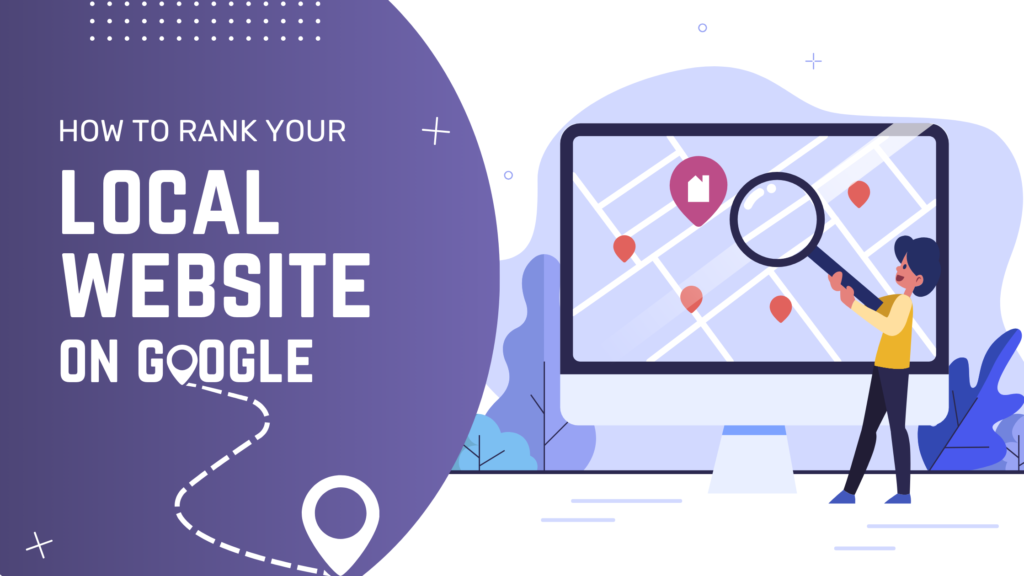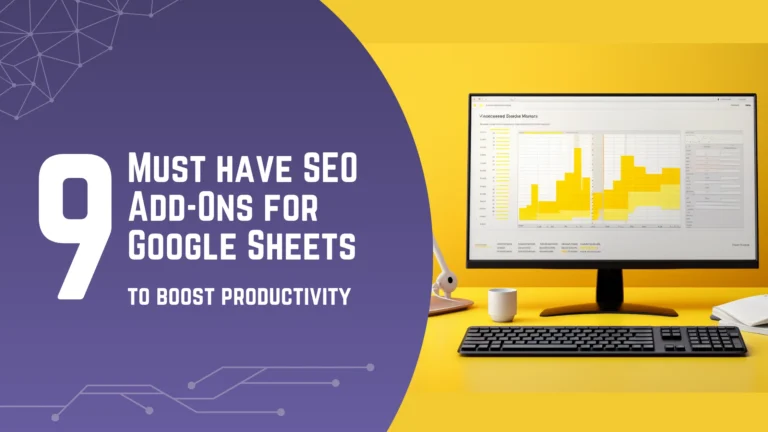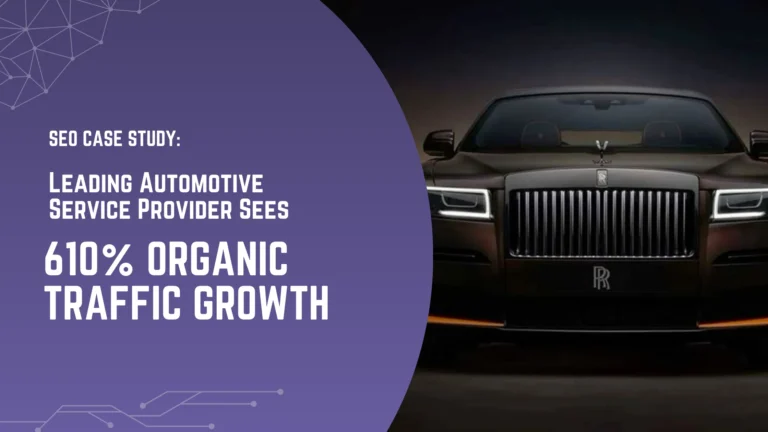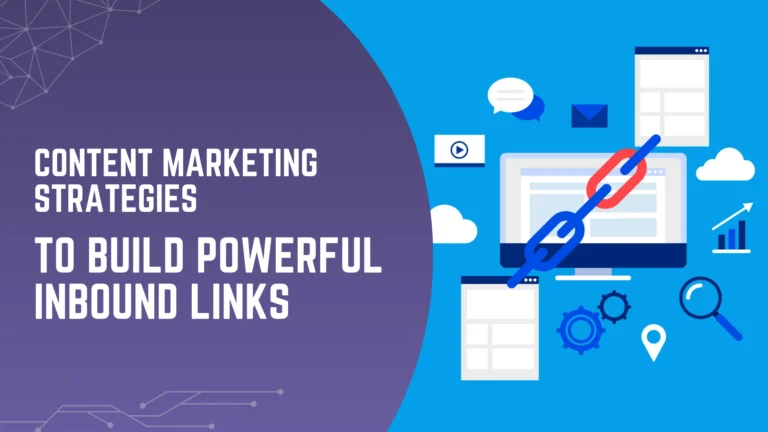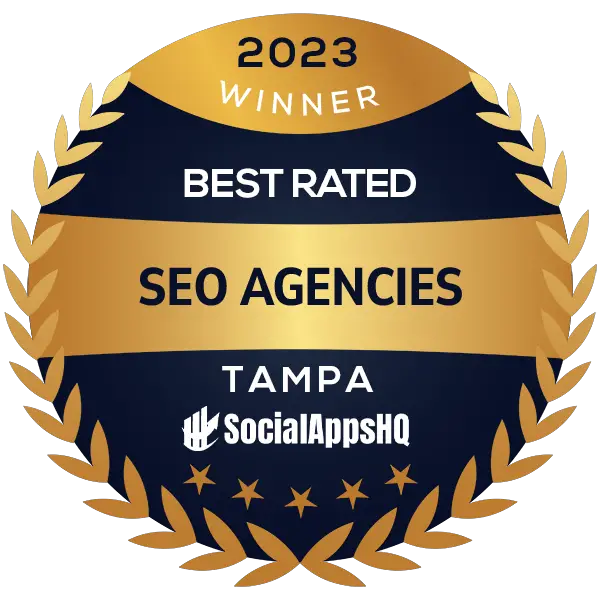In this article, I will show you how to rank your local website on Google.
(GREAT for 2023)
Special mention:
| I have tried to cover some untapped strategies that you MIGHT not have read before. |
Feeling excited right?
Me too!
Let’s find out how you can improve your website’s local ranking on Google…
First thing first:
What is Local SEO
Local SEO is a strategy that helps your local website to rank better for local intent keywords in a specific city.
Here is an example:

As you can see the website is ranking well for a local keyword:
Now:
Let me show you an interesting fact…
If Google thinks that the searched keyword has local intent, it may show some local website’s in the SERP.
For example:
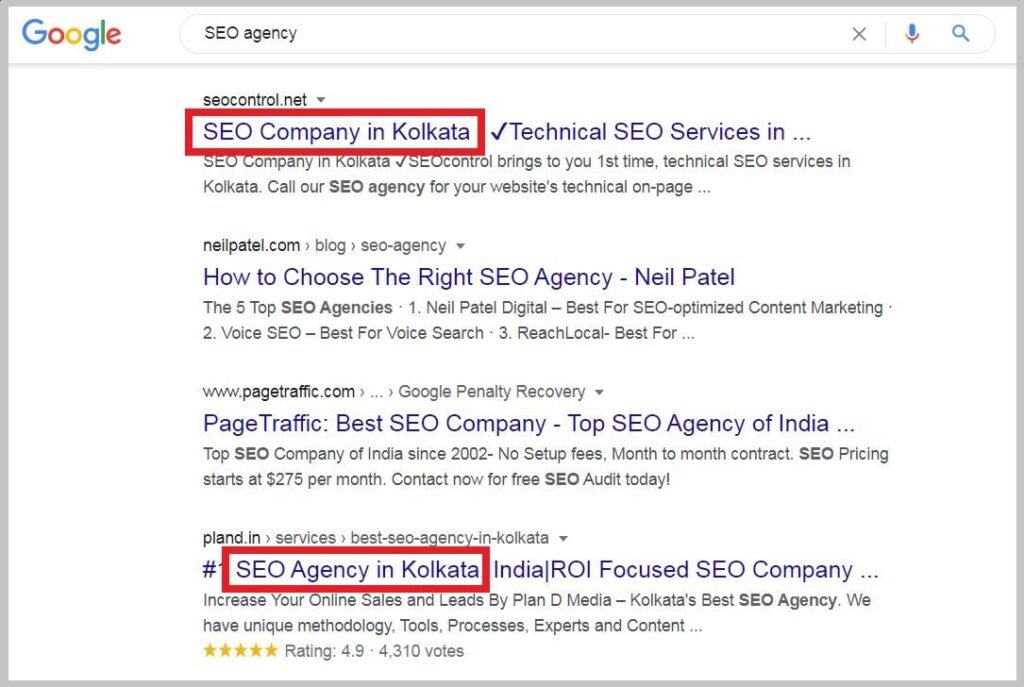
I haven’t used “In Kolkata” with my searched keyword…
Still, Google is ranking two Kolkata optimized pages.
Why?
There are 2 main reasons for this…
(A) I’m searching the keyword “SEO agency” from the Kolkata location…

(B) The keyword “SEO agency” has some local intent in nature.
That’s why Google is showing a few Kolkata based SEO companies in the SERP.
Cool 🙂
How to Find Keywords for Local SEO?
Keyword research is the foundation of any SEO campaign.
To rank your local website on Google’s first page, you have to invest time and come up with profitable keyword ideas.
How?
Gather a list of Seed Keywords for Your Local Website
Let’s say, you have a travel agency and your office is located in Kolkata.
So:
Your seed keywords would be:
- Travel agency
- Tour agency
- Travel company
- Tour operator
- …and more
Now:
Use The Power Of Google Autosuggestion
Search with these each seed keyword in Google (one by one).
And see what keywords Google is showing us.



Google is telling us, people are typing “in Kolkata” along with each seed keyword.
Hence, you need to add your primary location along with these seed keywords.
So:
The final keywords would be:
- Travel agency in Kolkata
- Tour agency in Kolkata
- Travel company in Kolkata
- Tour operator in Kolkata
These keywords have decent search volume (according to Google keyword planner).

The keyword “travel agency in Kolkata” has the highest search volume…
Hence, this local keyword should be your primary keyword for SEO ranking.
Easy right?
Now let me create a HORRIBLE situation for local keyword research.
Let’s say you are from Bankura district…
And you have a travel agency office there.
You searched “keyword + location” in Google Keyword Planner…
…and no search volume shows up for most of the keywords.

Oops!!
In this situation what should you do?
Well, there is a solution to this problem…
Select your target location (Bankura) in Google keyword planner.

Enter the generic keywords without the location (Bankura) in Google keyword planner.
Now see the magic…
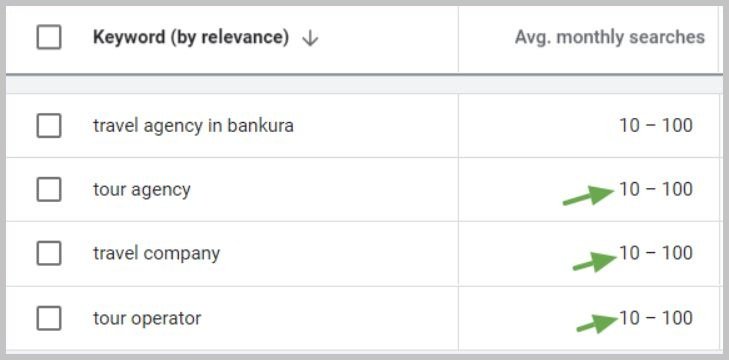
People are searching with these keywords from Bankura.
Interesting right? 🙂
| Remember: Make sure Google is ranking some local websites in the SERP for these keywords. Otherwise, it will NOT be possible to rank with these generic keywords. |
Now, you have collected some keywords for your local website.
What next?
Keyword Mapping for Your Local Website
Listen carefully…
This is a SUPER important chapter for local rankings.
What is Keyword Mapping?
Keyword mapping is the process of assigning keywords to specific landing pages on a website.
Let’s say you have a Digital marketing agency in London.
You are targeting only ONE location for SEO ranking and you have several services.
For example:
Your one location for local SEO ranking: London
…And you provide several services like:
- SEO
- Social media
- Google Ads
- YouTube marketing
- Content writing
In this example, what should be your keyword mapping plan?
Let me show you…
Your homepage should be optimized with your website’s overall main category.
…And your main category here is “Digital marketing agency”.
So:
The title tag of your homepage should be: Digital Marketing Agency in London
Because your company is an overall Digital Marketing service provider…
And each of your services MUST have inner landing pages…
Like this:

Or, like this:

Either way works.
Make sense?
Cool!
How to Optimize a Page for Local SEO?
Keyword optimized pages help Google to understand what the page is about.
If you don’t optimize pages with keywords, then your local website will NOT rank well on Google.
So, this is critical to make Google understand the main topic of each of your pages.
The question is how?
Add Primary Keyword in Page Title
(This is 100% MUST)
Let’s say, your primary keyword is “Travel agency in Kolkata” and the secondary keyword is “Tour operator in Kolkata”…
A few SEO experts would create a title tag like this:
“Travel agency in Kolkata | Tour operator in Kolkata”
…And it’s a BIG mistake, I often see.
Here is an example:

Here is another one:

What’s wrong here?
You DON’T need to use “Kolkata” twice in the page title tag.
Avoid this bad practice and apply this title format:
| Travel Agency in Kolkata: Best Tour Operator |
If you notice, I haven’t added “Kolkata” with the “Tour operator” keyword.
That’s because Kolkata is already included in the page title.
No need to stuff the same location again and again in the title tag.
Here is a real-life example from my website:

As you can see, I have included the location “Kolkata” ONE time in the page title.
And my webpage is ranking in Google’s top 3 position for both the keywords:

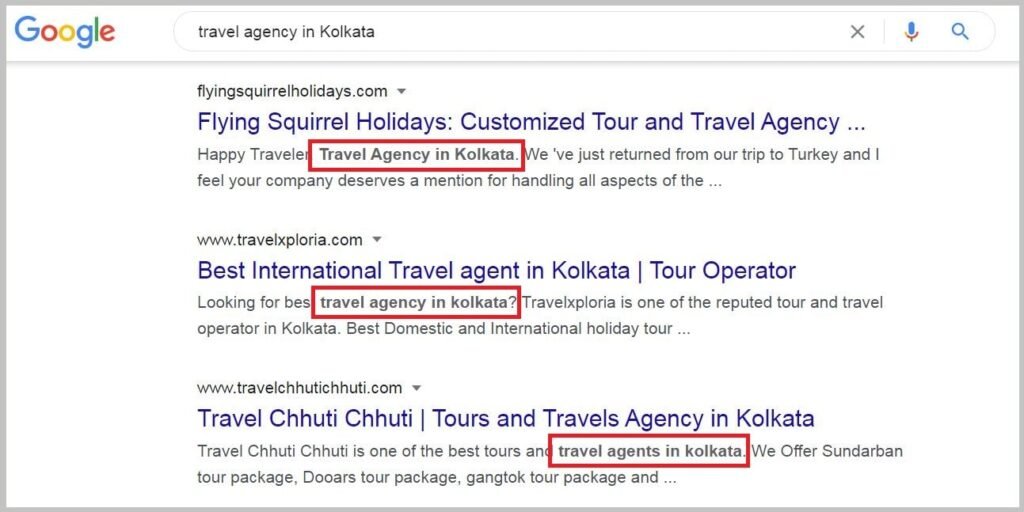
GREAT!
Add Primary keyword in Meta description
You should include your main keyword once in your meta description.
Why?
Because Google always bolds words that match the person’s search query.
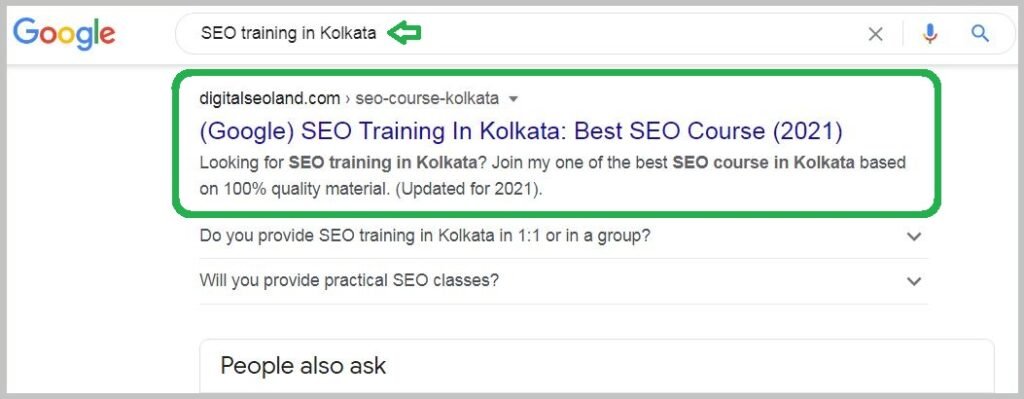
And this can improve the page’s organic CTR.
Lastly, Google also recommends that we should write meta descriptions for each page.

Add primary keyword in your target page’s URL
(Inner pages)
Your URL should contain your main keyword that you want your page to rank for.
When you include a keyword in your page URL, that keyword tells Google:
“This page is about that specific keyword”.
Here is an example:

Also, if people see the keyword in your URL, they will think that the page is highly relevant to what they are searching for.
Add Your Keyword in An H1 Tag
You should include your target keyword in the h1 tag.

Google said that: “Using an H1 tag helps them to understand the structure of the page.” |
Add Related Keywords or Synonyms in Your Page Content
Always try to add synonyms of your main keyword.
For example: Let’s say your target keyword is “SEO agency”.
Include synonyms like “SEO company” in your page content.
This will help Google to understand the overall topic of your page with 100% confidence.
Now you might be thinking:
How to find synonyms for your local website?
It’s actually very easy…
Search for your main keyword (digital marketing firm) in Google…
…And scan Google’s SERP carefully.
Look for bold words and phrases which aren’t your actual searched keyword.
Here is an example:
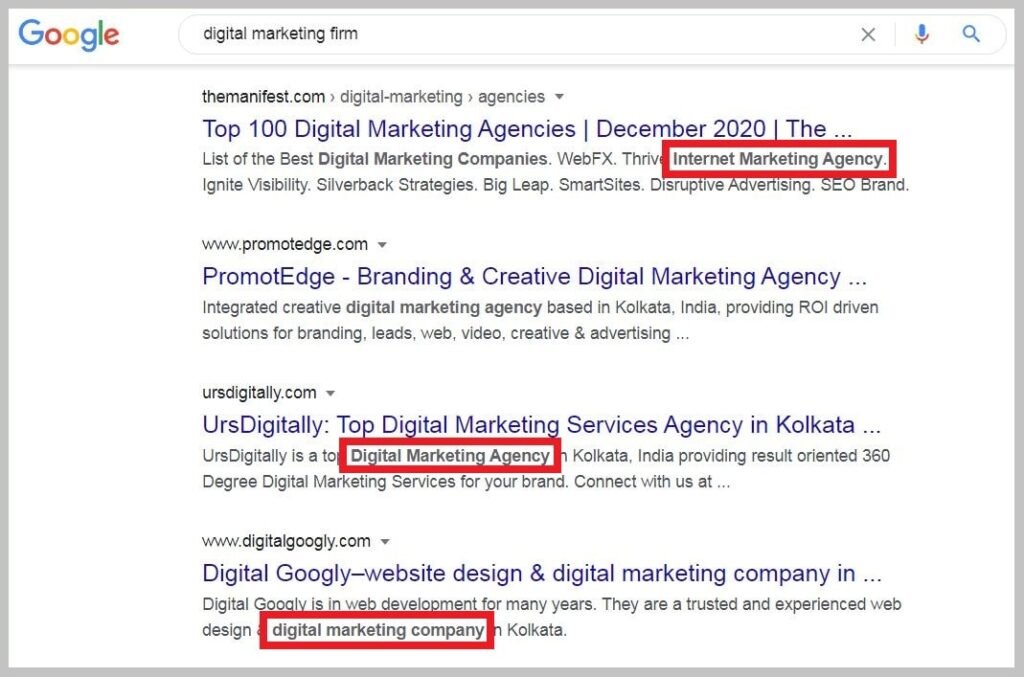
Google makes these words bold because their system thinks these are VERY similar keywords.
You should use these keywords in your page content..
…And you are done.
Add the Keyword as Early as Possible (Naturally)
It is critical to use your target keyword in the first paragraph of your page.
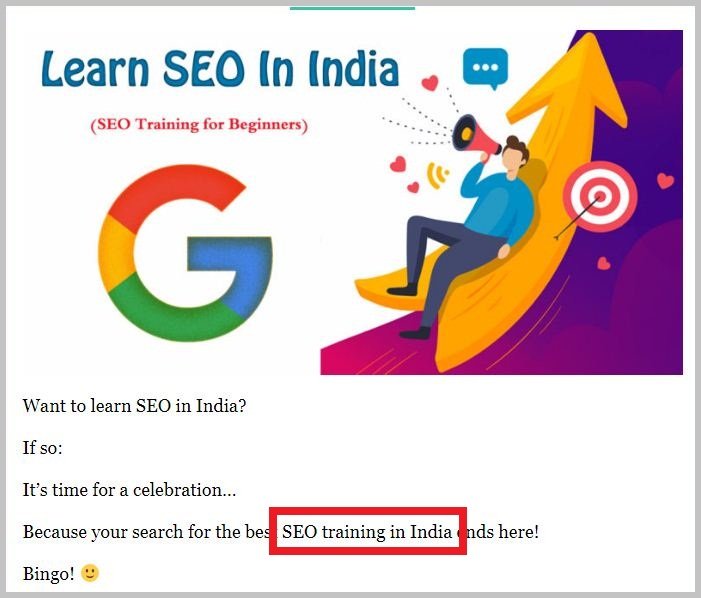
Why is this important?
This is one of those little on-page SEO signals that help Google understand what your page is all about.
Add Keyword in the First Image of the Page
Google’s spiders use ALT tags to understand what an image is about.
You should always use descriptive ALT tags for every image on your page.
I highly recommend using your main keyword as an ALT tag in the very first image of the page.
Here is an example:
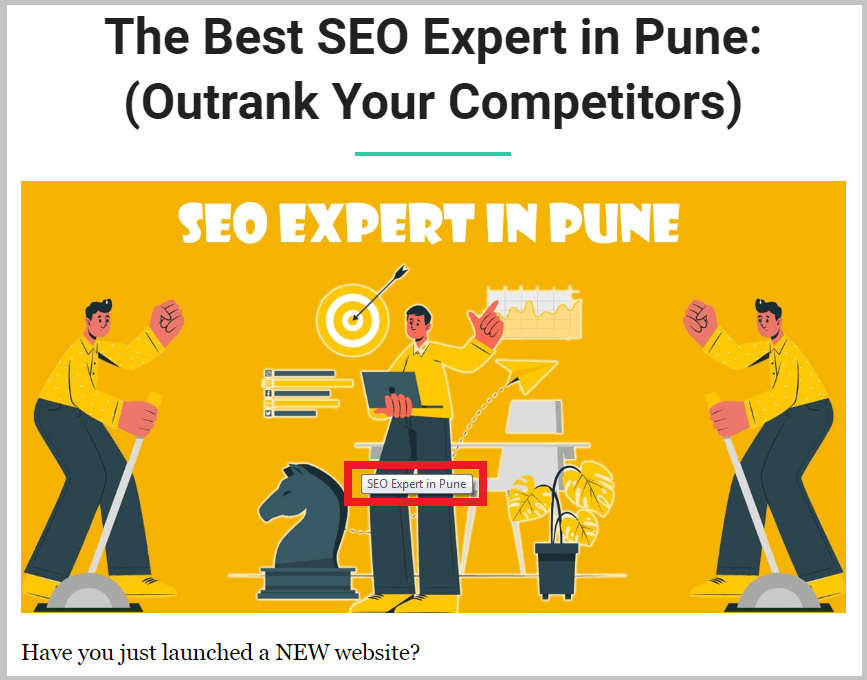
Add Your keyword a Few Times in the Body Content
This is important.
If you naturally mention your target keyword a few times in the content, it will confirm to Google that your page is about that specific keyword.
| Remember: Don’t do keyword stuffing in your content, it is against Google’s guidelines. |
Just include your keyword where it makes sense.
Avoid Keyword Cannibalization
This is an overlooked local SEO problem.
But:
First, you should know…
What is keyword cannibalization?
“Keyword cannibalization” is when two or more pages (from the same website) are competing for the same keyword…
I often notice keyword cannibalization issues on local websites.
Sometimes, a local website’s homepage ranks for their inner service page’s main keyword.
Let me walk you through a real-life example:
If you search with “Bulk SMS Hyderabad” in Google…
…You will see this website is ranking #1.
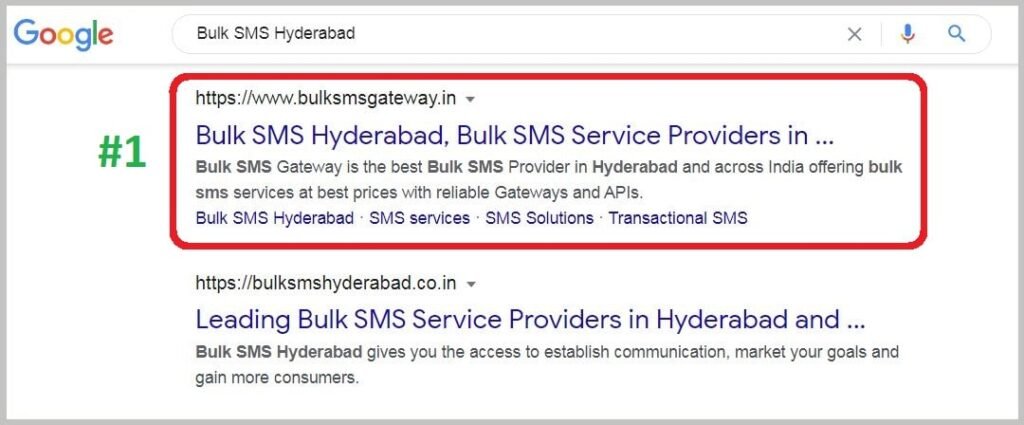
As you can see, the homepage is ranking #1.
Nice work!
However, there is a PROBLEM…
This website has a dedicated 1:1 landing page for this exact keyword…

Whatttttt???? 🙁
Their actual landing page is NOT ranking.
Instead, the homepage is ranking.
Problem!
How to solve this issue?
A: Need to remove the inner page’s local keyword from homepage title:

B: Need to remove the wrong keyword from the homepage meta description:

(C) Also need to remove the wrong keyword from homepage body content (if included)
In short:
You should un-optimize the homepage for Bulk SMS Hyderabad (WRONG keyword).
On the other hand:
Instead of Hyderabad, I would like to target the homepage for the “India” keyword.
Like: Bulk SMS provider in India
Why?
They have mention on their homepage: India’s #1 Bulk SMS Provider
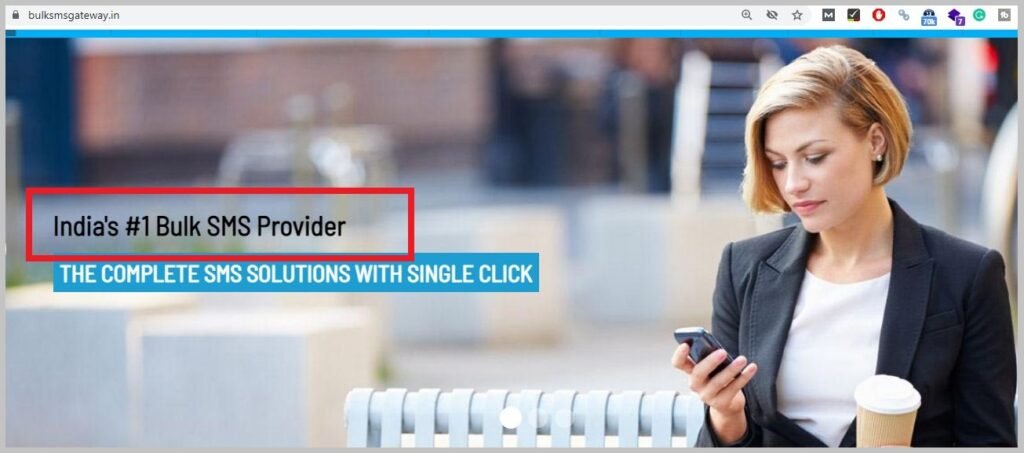
Also, they have dedicated city-based landing pages:
Here is an example:

In their case, it would make more sense to target the homepage with “India” location.
Lastly, need to re-index the homepage in Google (Google Search Console), so that Google can see the new changes.
WARNING: Don’t just immediately delete or change any page content once you identify any keyword cannibalization issue.
|
Is there any best solution to avoid keyword cannibalization forever?
In short: YES!
How?
| Create every page with ONE main topic (keyword) that way Keyword Cannibalization issues will NOT happen. |
No Need to Add “Near Me” Keywords in Your Website
I sometimes notice the “Near me” keyword in the page’s title tag in Google SERP.
Here is an example:
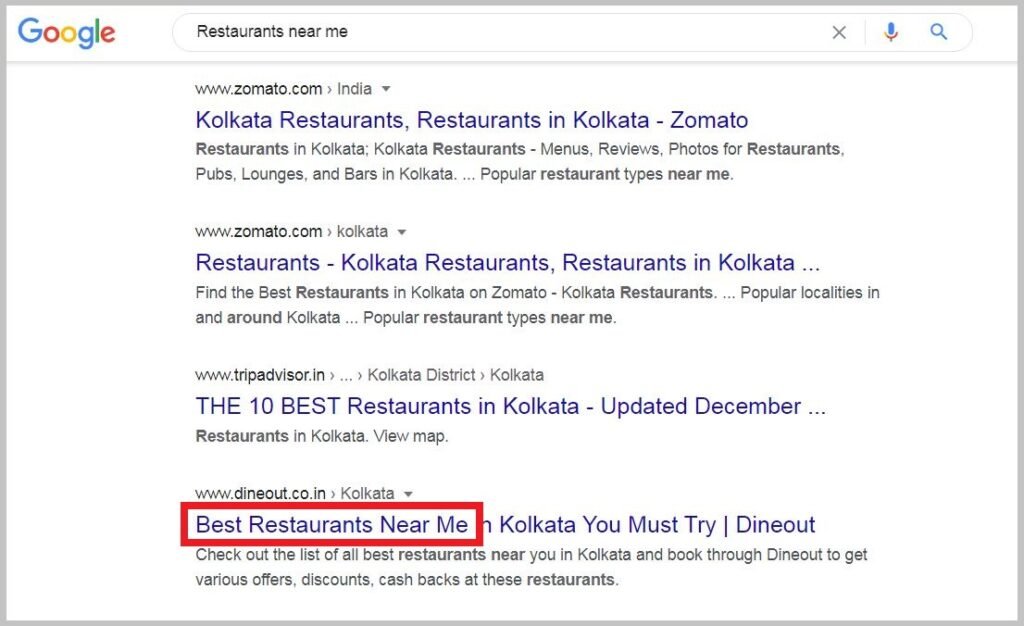
No need to add the “Near Me” keyword on your website’s homepage or service pages.
In my opinion:
It has NO role in keyword’s organic rankings in SERP.
Basically, the “Near me” keywords are for Google Local Pack rankings only…
…NOT for normal organic rankings.
For example:
If you search with “restaurants near me” look at the Zomato website’s title tags.
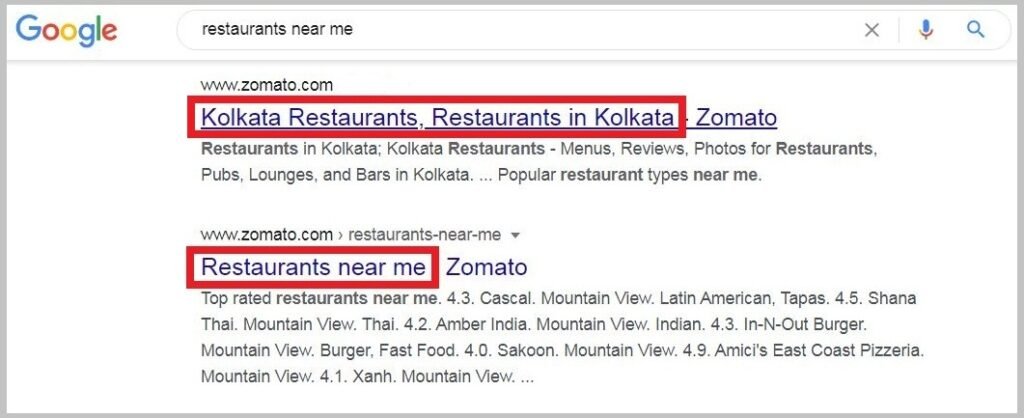
The 2nd page’s title tag from Zomato is optimized for the keyword “Restaurants near me”…
Not only that:
Look at the URL also…
It is optimized with the same “Restaurants near me” keyword.

Still, the page is ranking lower for the “Near me” keyword.
Why is that?
It’s because the “Near me” keyword is only for Google’s local pack ranking…
…which is tracking our IP address (our current location) and then ranks accordingly.
Your Website’s On-Page SEO HAS Key Role in Google Local Pack Ranking
If you optimize (with local keywords) your local website, it can help to rank in Google’s local pack.
Here is an example from Google:
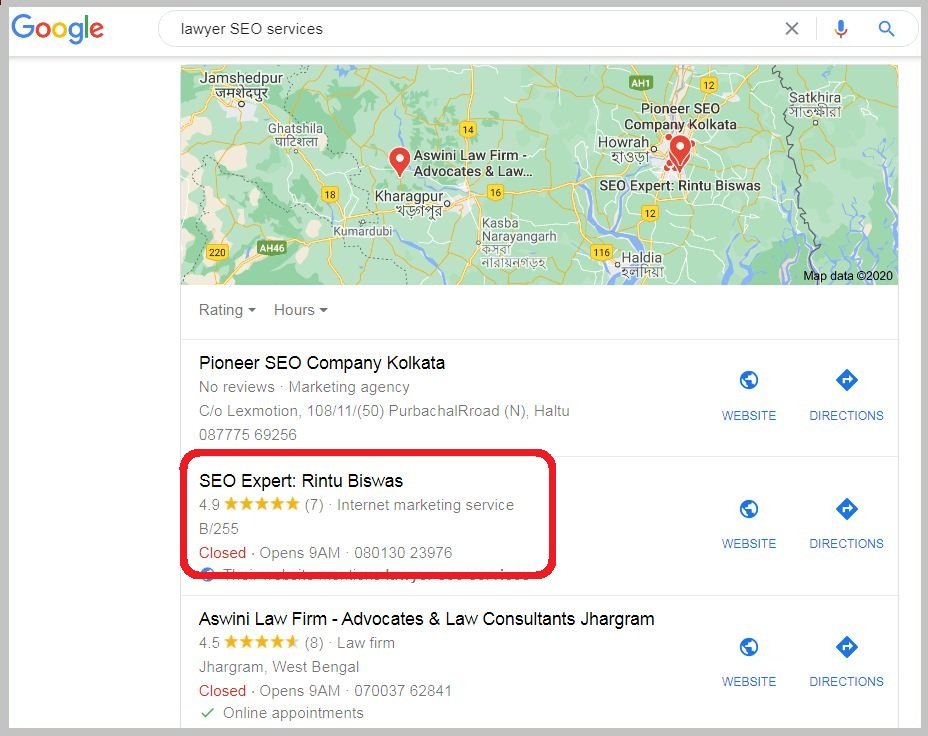
I haven’t optimized my Google My Business profile with the keyword “lawyer SEO services”…
However:
My GMB profile is ranking in the top 3 in Google local pack…
(I searched for the keyword from Kolkata)…
Why am I ranking?
Actually, I have a dedicated page on lawyer SEO services…
Google is showing: “Their website mentions lawyer SEO services”…
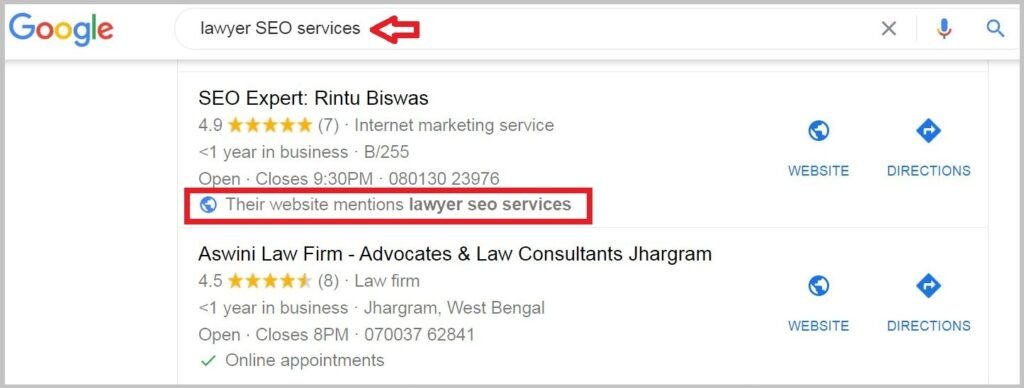
It shows us that, if you add your website in Google My Business, your on-page SEO can help in Google 3 pack rankings.
Nice! 🙂
Link Building for Your Local Website
Now:
Coming to one of my all-time favourite chapters in SEO…
“Link building”.
The game-changer!
I often laugh when a few SEO experts say “Backlinks are NOT needed” anymore.
Nice joke!
Here is the truth:
Backlinks are one of the BIGGEST ranking factors in SEO.
Google has a dedicated page about the importance of backlinks in SEO.

Now, Listen very carefully…
Backlinks are SUPER important, especially for HIGH competition keywords.
I 100% agree that there are so many other factors involved in SEO rankings.
Like on-page SEO, UX, content freshness etc.
However, backlinks are one of the BIGGEST deciding factors for Google to rank.
But wait…
There are some exceptions…
Do I need backlinks for ranking every keyword?
NO!
You don’t always need backlinks to rank.
If you are targeting a very LOW competition keyword, you don’t need that much of backlinks.
For example:
Take a look at my “blogging course in Ahmedabad” keyword.
My page is ranking #1 for this keyword (without any quality backlinks)…
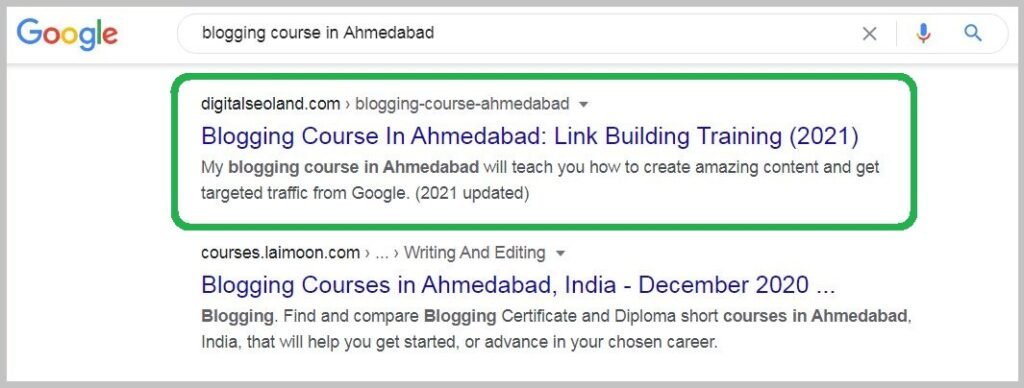
This page is ranking #1 because the keyword competition is EXTREMELY low.
In other words: It is an EASY keyword to rank.
Now:
Let’s Find Out a Few Easy Link Building Methods for Local Website
(A) Local Business Directories:
Google has mentioned that they gather data about your business from online directories.
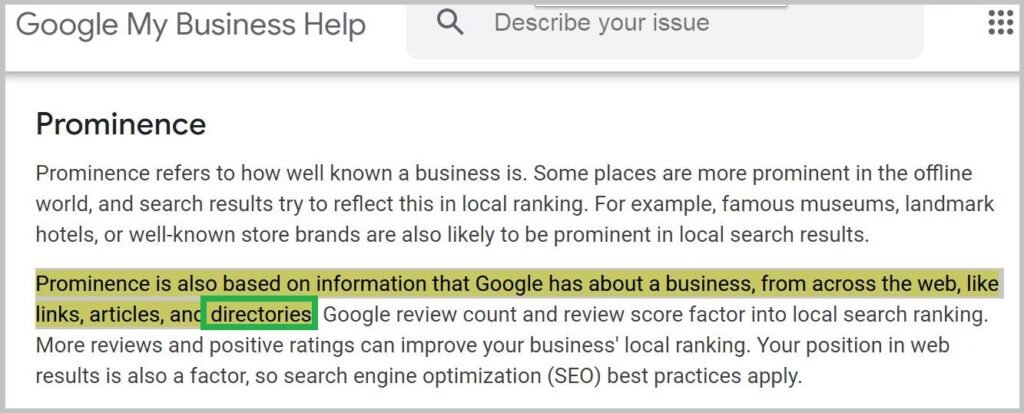
Remember: Online directory = Business directory/Business Citations
What is Business Citations in Local SEO?
Business citations are online mentions of your local business, which usually display your business’s name, address, and phone number…
…Collectively known as NAP.
Moz’s Business Citation Sources:
Moz did a GREAT job…
Moz has put together business citation websites based on different categories:
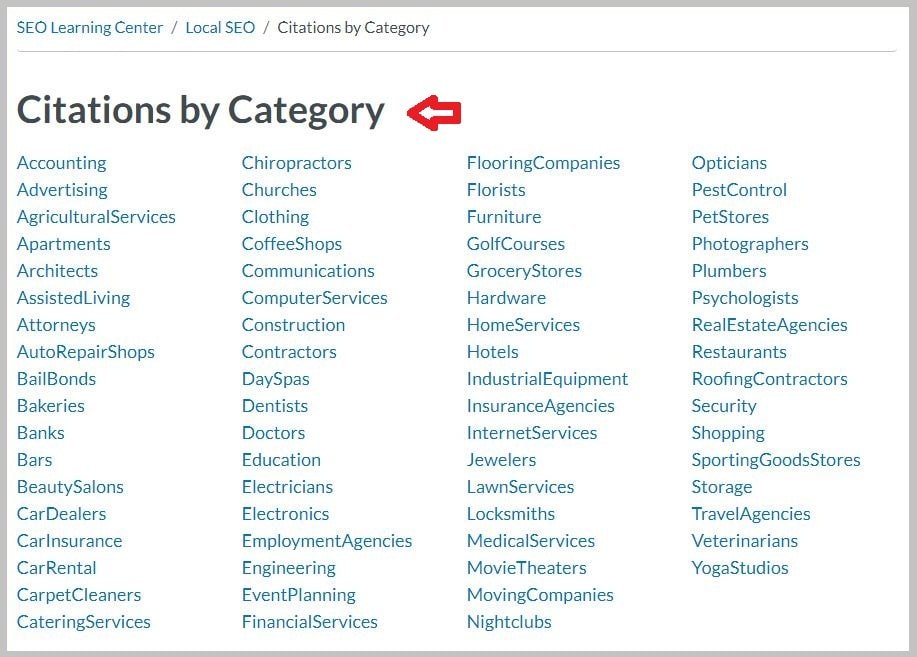
Now, let’s see…
How You Can Find More Local Citations Sources?
Use the following search operators to find lots of relevant local citation websites.
| City + FREE business listings City + FREE business directory City + FREE business directories |
For example:
If you are trying to rank your local website in “Chicago”…
You should search with “FREE local business directory in Chicago” on Google…

You will get FREE (mostly) and also PAID local business directories.
Remember:
Keep all the information about your local business 100% accurate on these directories.
And:
The Name, Address, and Phone number should match with your Google My Business listing and website.
Look:
Search engines are all about confidence…
So, make sure Google can understand everything about your local business and exactly where your business is located.
(B) Local Guest Posting Campaign (POWERFUL)
Will guest posting work in 2023?
YES!
Should I build backlinks only from guest posting blogs?
NO!
Look:
Over the past years, bad SEO experts and content marketers have used this technique in a spammy way.
Sad for other SEO experts!
However, if you focus on quality instead of quantity, you are safe.
What does mean by quality?
| Relevant guest blog + do-follow backlinks from body content + high quality informative content = Quality 🙂 |
Make sense?
Good!
How to Find Guest Posting Blogs for Local Website?
To rank your local website in Google, your goal should be getting the local backlinks.
For example:
If you have a travel agency in London, you should build backlinks from the .UK domains.
It will pass a STRONG local relevancy signal to Google…
Now:
Use the following search operators in Google to get .uk guest posting blogs.
| site:.uk write for us + travel site:.uk “Guest post by” + travel |
You will get a lot of local guest posting opportunities.
Like this:
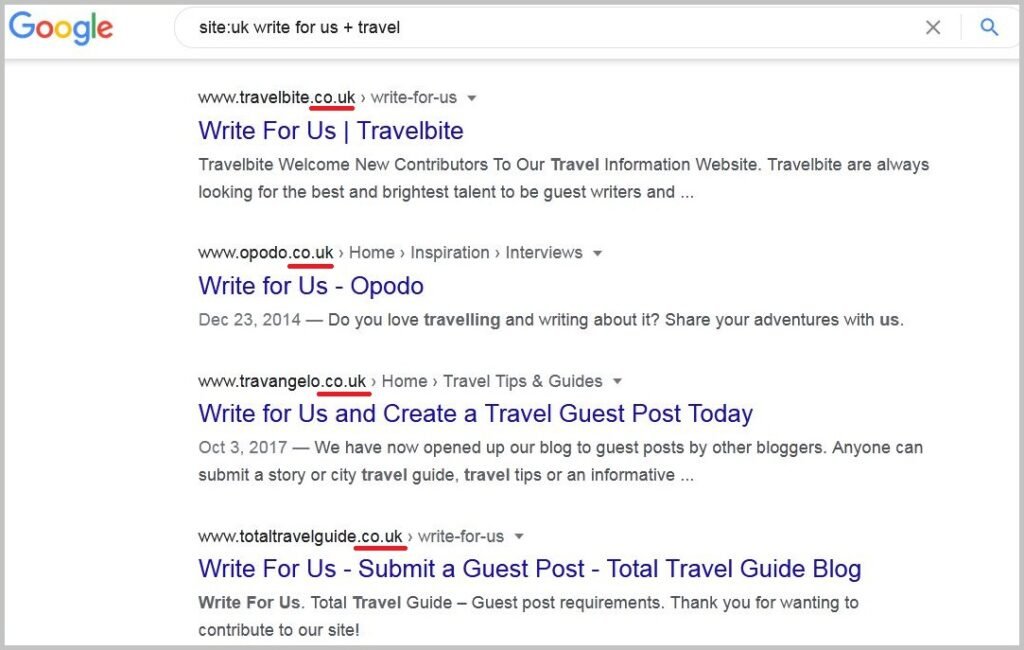
Nice! 🙂
| Read my step-by-step guide on guest blogging for SEO. |
The Final Words:
I hope you enjoyed my guide on how to rank a local website on Google.
(In 2023)
Now I’d like to hear from you:
Which strategy from this local SEO guide you loved the MOST?
Let me know by leaving a comment below right now.
I will be waiting
NOTE: I will keep updating this article in the coming days, as I’m NOT getting enough time now.

